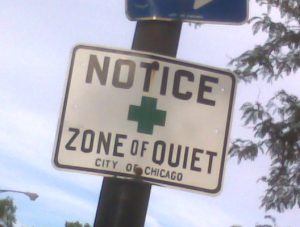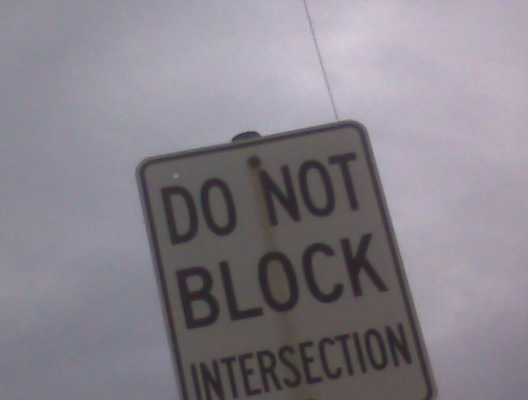I am staying about 5m walk away from the Memorial Children’s Hospital, which is, as the sign says, a Zone of Quiet. One up on a cone of silence I guess.
Today I did an additional iO workshop with a guy called Miles Stroth. He has a particular formula for playing, and over 5 hours we practiced one of those formulae.
Like all of the teachers we have had so far, he memorised our names (from us having told him once). It’s a party trick, but impresses people a lot. Our first teacher, Alex, knew our names before we knew each others’. Miles’ point was that he “bothered” to remember. Bothering to remember, bothering to listen was a theme for him.
He suggested there are 4 types of scenes:
– absurd
– character driven scenes (he said TJ of TJ and Dave fame does this type)
– Realistic (which Dave does)
– alternative reality (where we accept as true things which are absurd)
Monty Python did lots of straight absurd sketches – needed a straight guy to represent the audience (the dead parrot, the argument, the cheese shop).
The technique applies to any scene which opens with an “attack” (there’s no cheese; you’re late; you can’t wear that dress).
– accept the attack as a gift (great, I’m the kind of person who is always late, and is really relaxed about it)
– if their character is absurd, you be straight and vice versa
– if you are straight, call attention to what’s wrong (can feel inactive), call the strange behaviour
– if you are absurd be absurd, take only what you need from the straight guy’s lines (don’t answer the question)
– if you hit a wall, find a reason the absurd person is doing this
– if the other person starts arguing, go to a non sequitur
– if something is wrong, YOU did it
– at first react emotionally (few words) so the first player can get their idea out
– the more aggressive the straight guy is, the more absurd the absurd guy is
Other wisdoms:
– never help anyone (it kills the game)
– two positives or two negatives end up in an argument – you need one of each – it makes for tension, but not an argument
– if the game is “don’t touch the cheese”, don’t touch it, or the game is over
– normal behaviour is to justify or defend our behaviour – just accept it and use whatever they say and twist (“you keep breaking my things” – “you keep lending them to me!”)





